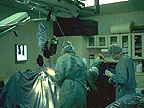By Ellen Kuwana
Neuroscience for Kids Staff Writer
December 17, 2002
 If you have red hair, you might want to talk to
your anesthesiologist before having surgery--and request more anesthesia!
A study has shown that women with naturally red hair require up to
20% more anesthesia than dark-haired women.
If you have red hair, you might want to talk to
your anesthesiologist before having surgery--and request more anesthesia!
A study has shown that women with naturally red hair require up to
20% more anesthesia than dark-haired women.
Researchers administered a commonly used inhalation anesthetic, desflurane, to
20 women (10 redheads and 10 non-redhead controls) between the ages of 19
and 40 years.  The researchers then gave small electric
shocks to the anesthetized women to measure their pain response. Compared
to the non-redheads, the redheads required more anesthesia to reach what
the experts judged an "optimum" dose. The optimum dose was determined by
the amount of anesthesia needed to suppress movement in response to the
small electrical shocks. Because this is a small study and only women
were tested, more research needs to be done before generalizations can be
made. The researchers then gave small electric
shocks to the anesthetized women to measure their pain response. Compared
to the non-redheads, the redheads required more anesthesia to reach what
the experts judged an "optimum" dose. The optimum dose was determined by
the amount of anesthesia needed to suppress movement in response to the
small electrical shocks. Because this is a small study and only women
were tested, more research needs to be done before generalizations can be
made.
Everyone has a unique response to pain. Something that is unbearably
painful to one person might be only mildly painful to another. Attention
to pain may also influence the perception of that pain. Redheads,
however, apparently feel pain more than most other people because of a
quirk of genetics that is linked to having red hair.
 Why would hair color matter? Scientists think that
the answer involves melanin, a pigment that influences skin and hair
color. Redheads have light skin because they have a defective receptor for
a hormone that triggers the production of melanin. This hormone, without
its receptor to bind to, may float around and bind to other receptors,
interfering with receptors on brain cells, such as those that influence
pain perception. Sound complicated? It is, a little. Why would hair color matter? Scientists think that
the answer involves melanin, a pigment that influences skin and hair
color. Redheads have light skin because they have a defective receptor for
a hormone that triggers the production of melanin. This hormone, without
its receptor to bind to, may float around and bind to other receptors,
interfering with receptors on brain cells, such as those that influence
pain perception. Sound complicated? It is, a little.
Let's pretend that the defective receptor is like a gate with a broken
lock and the hormone is a goat. Without the gate to keep the hormone where
it's supposed to be, it wanders around to neighbors' yards and eats all
their grass. So certain people have "damaged lawns," all because of a
faulty gate.
 Anesthesiology is a science and an art: it is a
balance between using too little anesthetic (recalling the events of the
surgery, feeling some pain) and too much anesthetic (low blood pressure
and heart rate). Don't worry -- anesthesiologists go through a lot of
training. Anesthesiologists must graduate from medical school (4 years)
and then complete a residency where they specialize in anesthesiology (4
years). Some of these doctors then complete a fellowship (1 year), where
they further specialize in fields such as pediatrics, neurology, or
obstetrics. Anesthesiology is a science and an art: it is a
balance between using too little anesthetic (recalling the events of the
surgery, feeling some pain) and too much anesthetic (low blood pressure
and heart rate). Don't worry -- anesthesiologists go through a lot of
training. Anesthesiologists must graduate from medical school (4 years)
and then complete a residency where they specialize in anesthesiology (4
years). Some of these doctors then complete a fellowship (1 year), where
they further specialize in fields such as pediatrics, neurology, or
obstetrics. | 

![[email]](./gif/menue.gif)



